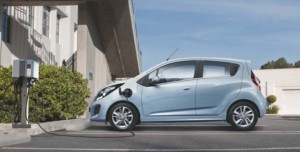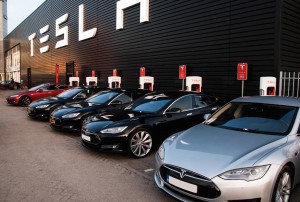
Oregon is looking to offset dwindling gasoline tax revenue by charging for 1.5 cents for each mile driven, which would help it get revenue from EV drivers.
Change is in the wind in Oregon. Actually, it’s in the way the state plans to raise money to pay for road repairs: by the mile.
The state is enacting a plan called OreGo, where it charges drivers by how many miles they drive rather than collecting taxes on gasoline, which is the conventional method for getting the funding. The idea is helping to raise revenue because as cars are getting better gas mileage and some aren’t using any gas at all, tax revenues are dwindling.
The $8.4 million program could be the model for other states, like Michigan, struggling to find ways to maintain and upgrade sagging infrastructure as tax revenues continue to fall.
Starting July 1, 5,000 volunteers can sign up to drive using electronic devices that track how many miles they drive. They will pay 1.5 cents per mile to travel on public roads in the state instead of paying the gasoline-based tax.

Electric vehicle drivers may no longer escape gas taxes in Oregon as a new volunteer program to charge users by the mile driven kicks off in July.
Some of those non-gas and hybrid drivers mentioned earlier aren’t happy.
“This program targets hybrid and electric vehicles, so it’s discriminatory,” said Patrick Connor, a Beaverton resident who has been driving an electric car since 2007, according to Autoblog.com.
Oregon isn’t the only state looking to ensure it collects tax revenue from every driver on the road. California is studied alternatives to the gas tax and is creating a pilot program. Washington is developing a program a similar to Oregon’s and there is legislation being considered in Indiana to do the same. Oregon officials say it is only fair for owners of green vehicles to be charged for maintaining roads, just as owners of gasoline-powered vehicles do.
(How do you get to work? Depends on where you live. For more, Click Here.)
“We know in the future, our ability to pay for maintenance and repair … will be severely impacted if we continue to rely on the gas tax,” said Shelley Snow, spokesperson for the Oregon Department of Transportation.
(Click Here for details about how the lack of fuel is limiting Hyundai hydrogen car sales.)
The program is the second phase of testing. The state has already conducted some smaller trial runs to work out the bugs and challenges that OreGo may encounter. It’s not restricted to EVs and hybrids. Any car can sign up, but there are some limitations. No more than 1,500 participating vehicles can get less than 17 miles per gallon, and no more than 1,500 must get at least 17 miles per gallon and less than 22 miles per gallon.
(To see more about how autonomous cars could lead to a slump in car sales, Click Here.)
The volunteers who drive vehicles with gasoline-powered engines are still on the hook for taxes when they fill up, but they will receive a credit or a bill monthly depending upon their usage rates.

Electrics and hybrids don’t even amount to a rounding error in road use/wear, and won’t for the foreseeable future.
The mileage-based tax schemes are just that, schemes designed to create yet another bureaucracy. Mileage-based taxes are exponentially less efficient than the existing fuel tax system.
Yes, we need to raise fuel taxes to account for the dramatic increase in fuel economy since the last time fuel taxes were increased.
More importantly, we need to ensure that every penny collected under the pretense of a road use fee goes directly to roads, and only to roads.
Even more importantly, we need to hold legislators accountable for adjusting the fuel tax when appropriate, and for preventing the current gross misuse of those tax revenues.
You got it almost right… LOL
EV’s and hybrids don’t amount to anything statistically but they certainly should pay a road use tax like everyone else.
There is no reason to believe that fuel taxes need to be raised when one considers that fuel taxes have been used for many programs other than what they were intended – to maintain roads and bridges. If the politicians actually used the funds for their intended purpose there would be little need to increase taxes which have been adjusted over time to compensate for inflation and financial corruption by states.
Holding elected officials accountable is pretty much impossible these days. They do what they want and they sell their corruption to the media as being visionary. The media rarely ever questions the unscrupulous behavior of the elected officials.
Have you seen anyone question the pulled from their orifice 54.5 MPG CAFE mandate? No you haven’t in mainstream media. This is Obama’s means to force impractical EVs on consumers. This is just one more example of bad government leading the populace into another expensive pipedream, as was gasohol. Duping the public for profit is what many politicians are all about. Taking care of their friends is the name of the game.
Tax payers are paying for all of the corruption and holidays of politicians.
http://www.judicialwatch.org/press-room/press-releases/judicial-watch-releases-records-detailing-government-funds-expended-on-first-daughter-malia-obamas-spring-break-trip-to-mexico/
All drivers should pay a fair roadway usage tax. Depending where you live the state tax can vary. Oregon has a state/local gas tax of .31-.33 cents per gallon plus the 19 cents per gallon Federal tax. Depending on how many miles you drive per year the 1.5 cents per mile might be OK or not.
IMO the increased fuel mileage has had almost no impact on road tax revenues. The real problem is that states and local municipalities have been negligent in maintaining the roads and stealing for years from the “general funds” to pay for many things it was never intended to pay for. They intentionally allow the roads to get bad so they can tell the public they need to raise taxes. MI told the liars in Lansing what they could do with their bogus tax rate increase.
interesting concept. Is the user billed monthly? I could see trying to pay this once a year, at registration time, as a burden for lower income folks.
GT101, as a Michigander I would gladly have voted FOR the tax increase IF it had been a clean, clearly defined program…we will raise taxes 1%, revenue will be X, and it will be spent solely on roads for two years. Then vote again. Prop 1 was Rube Goldbergian in its opacity. I’m sure that was on purpose, but it was a huge waste of time and money.
Any time taxes for road maintenance are placed in a general fund you know the roads will never see most of the repairs the money could have provided due to unscrupulous politicians.